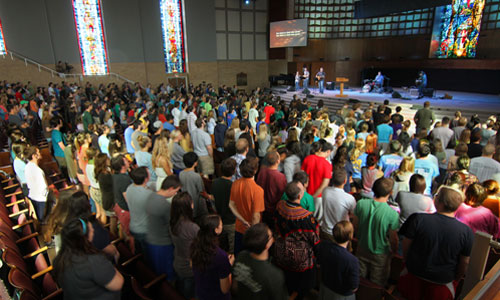Adams Addresses 'Cost of Missions' with Students
September 12, 2012
For anyone in the world who knows and loves Jesus Christ, someone made a sacrifice for that access to the Gospel message, Dr. Randy Adams told OBU students during a weekly chapel service Wednesday, Sept. 12.
Adams spoke during OBU's Global Outreach (GO) Week about "The Cost of Missions" -- what it costs for someone to follow God obediently in spreading the Gospel message in a dangerous world. Adams, who serves as church outreach director for the Baptist General Convention of Oklahoma, presented the second message students heard during GO Week, a concerted effort to mobilize OBU students to engage in missions endeavors.
Even for people who live in the United States and have had lifelong access to the Gospel, Adams pointed out that ancestors brought their Christian faith from their homelands. For example, for people whose families hail from England, the Church was planted permanently in England in 597 A.D. when Augustine of Canterbury obeyed the call to go from Rome and spread the Gospel.
Adams shared Psalm 67 with the students. The beginning of the Psalm reads, "May God be gracious to us and bless us; look on us with favor, so that Your way may be known on earth, Your salvation among all nations" (Psalm 67:1-2, HCSB). Adams said God ties his blessing to his mission. God blessed the Israelite people so that, through them, he might have a testimony to all the nations of the world.
"Where is the cost of missions in these verses?" Adams asked. "Every time God saves his people, preserves his people or works on behalf of his people, there is a cost."

"Our God is a God Who saves," OBU students sing during chapel on Wednesday, Sept. 12.
Adams gave examples from throughout Scripture in which God expended himself to save his people: By sacrificing his created animal to clothe Adam and Eve; in his efforts to save the people from Egypt; when he saved Daniel from the lions' den; and when he saved the children of Israel through David's victory over Goliath. In fact, Adams said, God will never ask his people to do something they are capable of doing unless he steps into the situation.
"If God doesn't intervene in your life and mine, if he doesn't intervene in our mission and our ministry, it's a disaster," Adams said. "It always requires the investment -- the giving -- of the Lord, and the psalmist understood that even when we gather the harvest, it is evidence of God's activity among us, blessing us, favoring us … so that we can be a testimony to the people of the world."
Adams said everything God did in the Old Testament to save and preserve his people was a foreshadowing of the mighty work of God in the New Testament through his Son, Jesus, who died on the cross to provide a covering for the sin of everyone who will believe in him.
"It was God who first spent," Adams said. "It was God who first loved. It was God who first gave. (It was) God's Son who first bled and died. Don't ever forget, when we think about the cost of missions, the cost our God has paid."
Adams encouraged the students to invest in the time and effort of concerted prayer before they make major life decisions, such as how and where they might serve God. He pointed out that between Jesus' ascension to heaven and the outpouring of the Holy Spirit at Pentecost, the only activity the Bible records is the prayer of God's people.
He also challenged the students to contemplate the cost of not going on mission. He illustrated his point with the story of Marco Polo, whose father sought hundreds of Christian helpers to spread the Gospel to Kublai Khan and his people. Instead, his father was sent back to China with only two people: Marco Polo and his uncle. Consider, Adams said, how different the world might be today if hundreds of people had helped spread the Gospel in China centuries ago.
Adams ended his message with the plea for each student to also consider his or her own relationship with God.
"The one message that will set your heart free is the message of Jesus," he said.
Click here to learn about OBU's Avery T. Willis Center for Global Outreach.